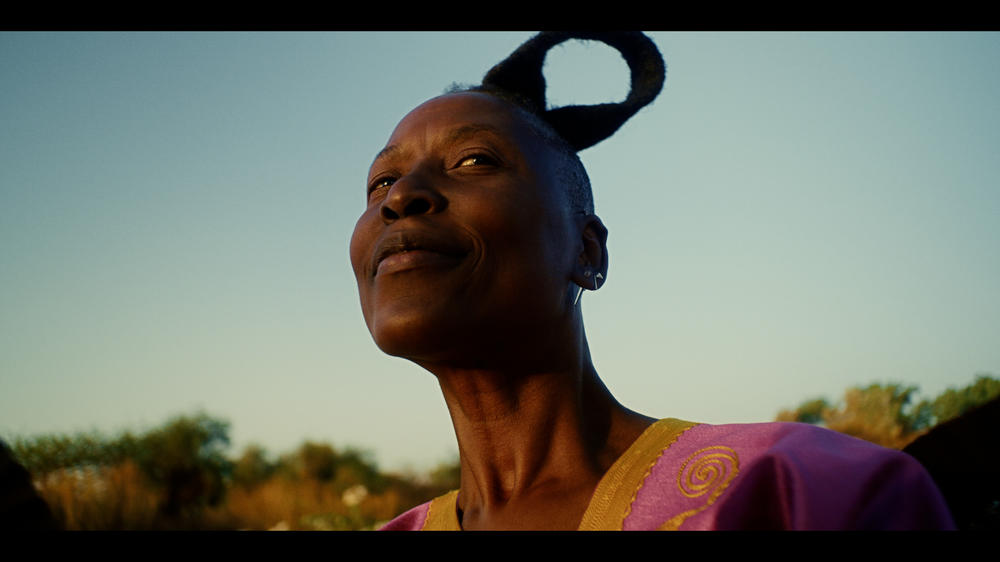nora chipaumire: Valeska Gert Gastprofessorin (Wintersemester 2023-2024)
nora chipaumire, film still, NOT waiting - Picasso Dance, concept by nora chipaumire in collaboration with Germaine Acogny, directed by Thibaut Charlut, commissioned by arte / la blogothèque
nora chipaumire was named Valeska Gert Visiting Professor at Freie Universität Berlin for the 2023/2024 winter semester. The internationally renowned dancer and choreographer showcased her artistic work in two public events at the Akademie der Künste to celebrate her artistry. The first of these will be held on October 24, 2023, where she examined dance in the university context. The second was a lecture, performance, and discussion held on February 6th of 2024.
chipaumire was born in 1965 in what was then known as Umtali, Rhodesia (now Mutare, Zimbabwe). A four-time Bessie Award winner and proud recipient of the 2016 Trisha Mckenzie Memorial Award for her impact on the dance community in Zimbabwe, chipaumire was also nominated for a NAMA Award as an exiled Zimbabwean making an impact on the arts at home and abroad in 2020. chipaumire has also been honored by arts communities around the globe, having received a grant from the Andrew W. Mellon Foundation (2021), a Guggenheim Fellowship (2018), a Foundation for Contemporary Arts Grant (2016), a Doris Duke Artist Award (2015), and a Princeton Hodder Fellowship (2014).
In the opening event of nora chipaumire’s Valeska Gert Visiting Professorship, the renowned dancer and choreographer critically addressed dance in the university context and explore self-examination, reflection, and transformation through physical manifesto. In the subsequent conversation with Lucia Ruprecht and Lindsey Drury, chipaumire will discussed her artistic practice of Nhaka and how it informs her decades of work in many university-led initiatives – often as the only person of color (or African), or artist of color, present.
As Valeska Gert Visiting Professor, chipaumire asked: “In an era when study, knowledge, and the role of the university as a place to gather are being questioned and queried, one could also ask: what about the artist as guest in these fundamental institutions? What is expected from them, what should their role be? How does the artist enhance the interrogations and make way for other unexplored mindsets and thoughts?”
During her Visiting Professorship, chipaumire further collaborated with master’s degree students in the dance studies program on her long-term research project “Nhaka,” a technology-based practice and process to her artistic work. Nhaka (inheritance, legacy – in Shona language) is an animist decolonial practice and theory that I have been cultivating. The work and philosophy owe its genealogy to Shona culture and Shona spiritual practices. chipaumire has been decoding, recoding, and coding such strategies on how to discipline and build the physical body, in hopes of developing an organism that can reflect and produce gestures that expand our understanding of the human and the relationship of the human organism with the natural and spiritual world.
The closing event of chipaumire’s Valeska Gert Visiting Professorship took place on February 6, 2024. Organized as an urgent gathering, conducted in-the-round, the closing of chipaumire's Visiting Professorship centered on a question: What revolutionary gesture can possibly be left after 1989, in a city like Berlin, in a country like Germany, in a place like Europe?
Drawing from the lived history of toi-toi protest dancing among the Shona people, this event was a gathering in which the weaponization of bodies for the purposes of political resistance could be laid bare and critically addressed. What is it to be implacable in a politics alive with presence? How can you overcome a state of precarity while living in and fighting from an historically othered body? In times that feel – and perhaps are – apocalyptic, how can we develop an ethical and moral responsibility for our bodies?
The event was made possible by the thoughts and bodies of chipaumire, dancer and musician SoKo Jerahuni, and critical dance studies students at Freie Universität. It is presented by the Akademie der Künste, DAAD, and Freie Universität Berlin.
Valeksa-Gert-Gasprofessur
Eine Kooperation zwischen der Freien Universität, dem Deutschen Akademischen Austauschdienst (DAAD) und der Akademie der Künste Berlin.
Seit dem Wintersemester 2006/2007 besteht am Institut für Theaterwissenschaft die Valeska-Gert-Gastprofessur. Getragen wird diese Einrichtung mit semesterweise wechselnder Besetzung von der Freien Universität Berlin, dem Deutschen Akademischen Austauschdienst (DAAD) und der Akademie der Künste Berlin.
Namenspatronin der Gastprofessur ist eine der innovativsten Tänzerinnen der historischen Avantgarde, Valeska Gert (1892-1978), deren Schaffen thematisch stark durch die Stadt Berlin geprägt war. Sie steht damit stellvertretend für Tänzer und Choreographen, die es zu entdecken gilt und deren Geschichte noch zu schreiben ist.
Zur Funktion der Gastprofessur:
Theoretische Ansätze auch praktisch anzuwenden und umgekehrt praktische Ansätze in den wissenschaftlichen Diskurs aufzunehmen, ist ein wichtiger Teil des Masterstudiengangs Tanzwissenschaft. Dabei geht es weniger darum, vom Wissenschaftler in die Rolle des Künstlers zu schlüpfen - vielmehr sollen die Studierenden hier die Möglichkeit erhalten, anhand konkreter Projekte Forschungsprozesse zu durchlaufen, in denen sich Theorie und Praxis vermischen. Praxis ist hier durchaus auch tänzerisch-performative Ausführung - jedoch immer mit einem analytischen Blick, der Strukturen und Verfahrensweisen zu erkennen und nachzuvollziehen sucht. Dieses Arbeiten führt, das zeigten auch die Seminare bisheriger Gastprofessor/inn/en zu angeregten Diskussionen über Unterschiede, aber auch Überschneidungen von künstlerischer und wissenschaftlicher Forschung. Es entstehen so Austausch und Dialog zwischen Künstlern und angehenden Wissenschaftlern, ein gegenseitiger Einblick in die jeweiligen Arbeitsweisen, der ganz sicher für die Studierenden, aber durchaus auch für die Künstler sehr wertvoll sein kann.

